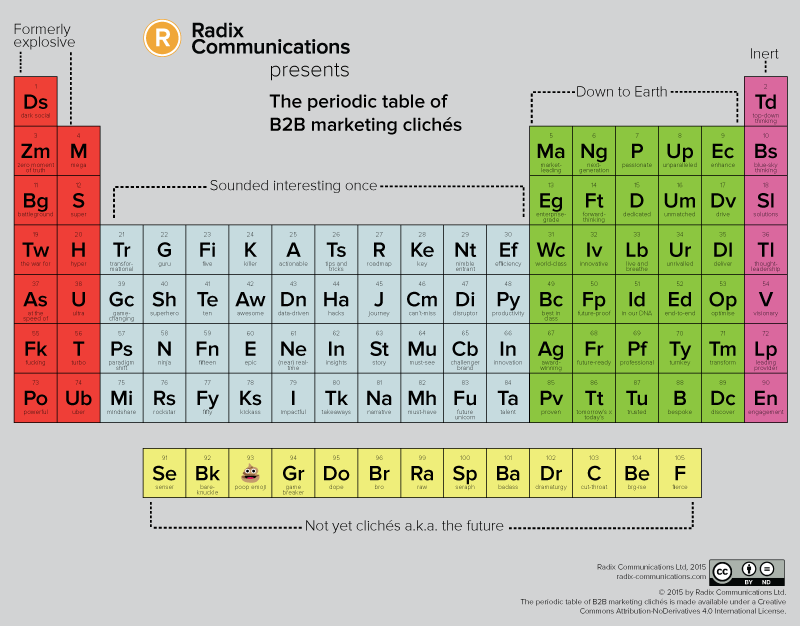There are many, many great things about being a B2B technology copywriter. You get to meet some extremely clever people, doing extremely clever things with technology, and you get to do your favourite thing, which is to write about it. As an extra bonus, of all the specialist copywriting niches, it’s one of the best-paid (especially if you can do it well).
But this post isn’t about relentless positivity, it’s about the downsides of this strange semi-profession that almost no one wants to be when they grow up.
(Search “aspiring screenwriter” on Google and you get over 87,000 results. Search “aspiring technology copywriter” and you get just one. It’s an –ahem – exclusive club.)
So what’s the worst thing about being a B2B copywriter? Here are my top four:
1. It’s hard.
Unless you have a background actually working in enterprise tech, you’re always writing about things you don’t fully understand, and will probably never have direct experience of.
It’s one thing to know how to set up your home WiFi network. It’s another thing entirely to write an ebook that will convince a CIO to outsource all of their software testing, or the chief risk officer of a global insurance company that their current risk calculation models are flawed.
Unless they’re ex-journalists, most copywriters have never met the CIO or chief risk officer of a global company. We’re constantly working at the very edge of our capabilities: trying to understand what a client’s products and services do, and then pitching them at the right level to convince unknown senior executives that these products and services are exactly what they need.
Pitch them wrong, and at best the whole exercise is a waste of time. At worst, it could actively damage your client’s brand image, ensuring you never get any work from that client again.
Getting it right takes an enormous amount of skill: from knowing the right questions to ask your client, to understanding the other options your CIO or CRO might have on the table, to pinpointing the one thing that will make your client stand out in that line-up, and then using the power of your writing to get the CIO’s or CRO’s attention for long enough for them to consider it. It’s exhilarating, but also exhausting.
2. It’s not glamorous.
Why do 87,000 people want to be screenwriters, but only one wants to be a tech copywriter? Because tech copywriters are never going to get to hang out with Brad Pitt or be nominated for a Best Screenplay Oscar. There are no red-carpet awards for tech copywriting. There aren’t any awards for it at all. You can’t make a name for yourself, because your name never goes on your work (unless you count posts like this).
Sometimes, people even seem to have trouble recognising that copy is produced by actual human beings. The other day I saw an email that referred to the copywriters on a project simply as “resource”, as if we were a mineral deposit to be mined for subject lines and calls to action. In Skyword’s infographic of the content marketing ecosystem, writers don’t even feature in the “original content creation” bit, just the platforms that sell their services.
3. No one understands what you do.
People at parties ask me what I do. I say “I’m a copywriter”. “What’s that?” is the usual response. This mystifies me a bit, because I don’t think copywriting is that obscure a profession, is it? Especially not now there’s Mad Men. But most people either seem not to know what it is at all, or they assume it’s something to do with copyright law and that I am, therefore, a high-flying powerful genius lawyer type, like Glenn Close in Damages. (It’s quite funny to see people mentally trying to square this assumption with the awkward, scruffy, five-foot person they see in front of them.)
I usually explain in what I think are the simplest possible terms: “I write marketing brochures for technology companies,” but sometimes even this doesn’t seem to enlighten them. I’ve learned to get round this by not going to parties any more.
4. No one ever tells you how you’re doing.
I’m perfectly fine with the three things listed above – I like work that’s extremely hard, I couldn’t care less about hanging out with Brad Pitt, and I’m not bothered that no one understands what I do (although it does sting a bit when it’s your own family). But the one that gets me is that, for reasons I don’t fully understand, no one ever seems to give copywriters feedback on how their work performed.
Sure, we get plenty of feedback on our copy while we’re writing it (for me, it’s usually “Too wordy” or “Needs punchier title”), but when our clients come to send the finalised copy out into the world to do its job of generating leads and conversions, it’s almost always followed by complete radio silence.
Usually, the only indication we have that our work is any good is when clients come back to us for more. Very occasionally, a faint message might reach us from the great beyond: the other week, one agency client sent on a bit of feedback from an end-client I wrote an ebook for two years ago. “The best-performing piece of content we’ve ever done, by several country miles,” it said.
Whaaat? Why had no one thought to tell me before? How am I supposed to know what works, and what doesn’t? How am I supposed to get better?
I don’t actually know how many other copywriters find the same, but personally it would make my life so much better to get hard, statistical feedback on open rates, downloads, clickthroughs and views. For now, all I can do is keep asking for it, and hope one day to get the answers.
Keep up-to-date with B2B copywriting trends
Sign up for our monthly B2B copywriting insights email.


